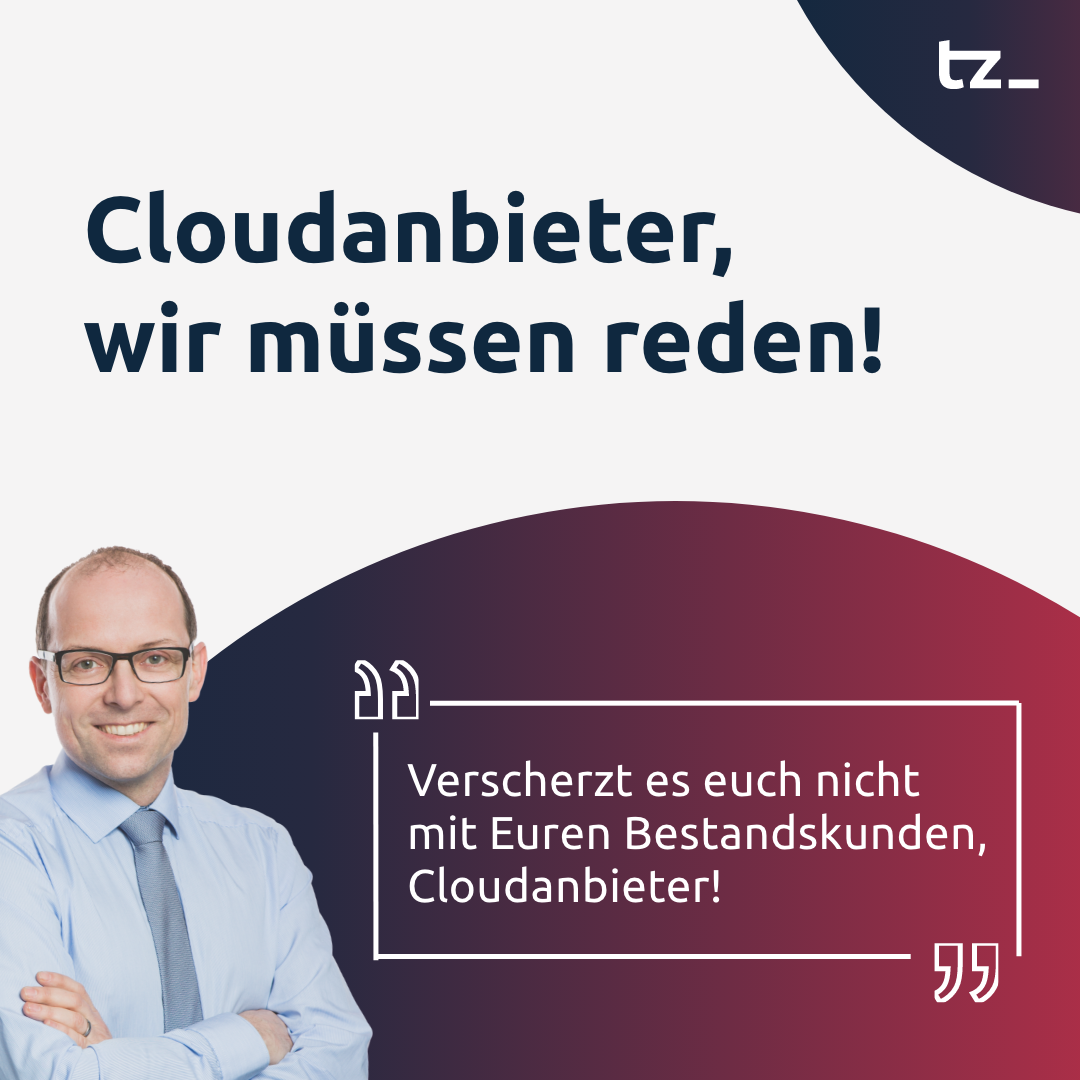An unattractive trend is spreading: providers of cloud solutions are exploiting the dependency of their existing customers and changing the previous conditions – in some cases drastically. This destroys trust, not only in the respective provider, but in cloud solutions in general.
There are simple cloud solutions that can be quickly replaced. For example, if it’s simple cloud storage, switching is very easy. Competition ensures that the offers are always better and that prices do not gallop away uncontrolled. But there are also cloud solutions that companies opt for in the long term. This applies, for example, to complete business processes that are outsourced to the cloud.
The introduction costs a lot of time and effort. The investment pays for itself through the use of the system over an appropriate period of time. The scope of services of the selected tariff and the associated costs play an important role in the decision. Continuity and trust are the basis for the decision to move to the cloud. Irritatingly, recent incidents have shaken customer confidence in SaaS cloud providers.
This no longer affects only individual platforms. Business owners I speak with are again asking the question of trust regarding cloud applications as a whole. Cloud SaaS providers need to offer their customers the same level of loyalty they expect from their customers. The high dependency of the customer on the provider, which results from his decision for a platform – the lock-in effect – must not be exploited!
I have noticed the following situations in recent months and years:
Integromat becomes Make – and unsettled its customers
Celonis acquired start-up Integromat at the end of 2020. As part of the acquisition, Integromat will become Make. With the move, new conditions are announced for all customers. The argument is based on new services and functions – but these are not relevant for the customer we are serving at the time.
It has long been unclear whether existing customers will be able to keep their conditions. It was only late in the process (early 2022) that the provider relented after receiving a lot of customer feedback and guaranteed that customers could keep their current rate at the previous conditions as long as they did not switch rates themselves.
For our customer – with ambitious plans – this came too late. We switched to Node-RED early in the project. The license-free OpenSource version is completely sufficient for the purpose, offers enough flexibility and reserves for expansion. A managed instance is operated by a regional IT provider at a very fair price. The number of individual transactions now no longer plays a major role in further growth.
Ninox receives new investment – and turns the performance screw
In the spring of 2022, another round of financing took place at low-code provider Ninox. Shortly thereafter, new plans were presented – and in these, the benefits are being turned first: Instead of an unlimited number of API calls, the amount is to be reduced to 1,500 per month in the future. This is clearly too little for serious applications that run synchronously with each other. This is clearly too little for serious applications that run synchronously with each other. Those who really want to work with the API should therefore now enter the business tariff, which offers up to 30,000 calls per month.
For one customer, we specifically addressed this issue before starting the project, as it is an important variable for an integration project with a low-code platform. A „grandfathering” originally promised to the customer was later limited in time after all and led to a considerable loss of confidence in the provider.
Ultimately, a personal meeting with the supplier and a factual consideration of all alternatives at the time of the already advanced project led to the decision to continue the cooperation. However, for the customer relationship and trust in the supplier, the behavior was anything but optimal.
Podio abolishes its most important USP – and earns massive criticism
Podio – originally a start-up from Denmark, later acquired by Citrix and now part of the Cloud Software Group – informed its customers about “Exciting News” in mid-2023. Especially about the new business model that puts the axe to the most important USP: Previously, guest users could be invited into a Podio customer’s organization to work together for free. For years, this was a strong argument for innovative companies that used the platform to digitize processes and communication across company boundaries. Podio’s offer was unique in the market. Along the way, customers helped make Podio increasingly well-known – invited guests were able to experience the power of a low-code platform for themselves.
Combined with a very short lead time, the announcement caused panic and really bad air in the forum. This is understandable – after all, many organizations have established processes that actively involve external users in processes. Processes that now have to be changed over in the short term so that costs do not suddenly increase – as mentioned in an example by a user in the forum – by up to 13 times. Besides, discounts were abolished (ok, they were voluntary) and the minimum number of licenses was simply increased to three.
Sure – the success of this feature may have led to a decent load on the platform. Nevertheless, it should not be that one of the most important features – even more so with such short notice – is simply deleted without replacement. Again, „grandfathering” would have been appropriate.
What is actually „grandfathering”* („legacy in”)?
„Grandfathering” (or better, „Legacy in”) in the context of SaaS providers means that existing customers continue to be served under the old contract terms or pricing structures as long as they remain on the chosen plan. The new rates and conditions apply to new customers and switchers who choose one of the new plans themselves.
On the other hand, existing customers do not automatically receive every new feature. That’s fair: SaaS providers are allowed to charge higher prices for higher performance and new features via new plans. With legacy rules, long-standing customers are not surprised by sudden changes in the framework conditions and dependencies are not exploited.
*) There is discussion whether the term “grandfathering” is still appropriate. „Legacy in” is an alternative, non-critical term.
I have also discussed the issue with other cloud service providers. There was some understanding: The further development of a platform costs money and the general inflation does not stop at the providers.
Still others argue the discrepancy between the company’s actual and theoretically possible sales. But – these are just purely theoretical sales: Customers felt the original deal was fair – the combination of available features and price was right at the time of the decision. You have decided to pay a certain price for the service offered.
Should there be newer, more expensive plans with a better price/performance ratio – wonderful! This allows SaaS providers to convince customers to grow with them and take advantage of much more performance for a little more money. However, it is unclear whether these new features will have any benefit for existing customers. It is no good as an argument for a forced price increase.
It is not easy to reconcile both interests – the economic growth of the provider and the desired stability of the framework conditions for customers. Cancellation in the event of price increases is always possible, but switching is always associated with high extra costs for the customer.
You do manage to distinguish between Starter, Premium and Enterprise, don’t you? You do manage to distinguish between Starter, Premium and Enterprise, don’t you? It should not be a problem to continue running “Legacy” plans as well.
Dear Cloud Providers,
it took years to convince customers and build the necessary trust to run key business processes in the cloud. Don’t put that at risk for what you think is a quick buck.
Don’t let short-term growth targets and acute sales pressure cause you to treat your existing customers unfairly.
Offer „legacy in” as a guarantee – no ifs, ands or buts. Build exciting new features so customers voluntarily and happily switch to your new plans.
Dear SaaS customers,
talk to your providers about „legacy in” and document important framework conditions before signing a contract.
If possible, clarify details of a later exit with cloud providers before signing the contract. Comparable perhaps with a prenuptial agreement, in which details for a separation are also clarified.
Demand binding rates with a reasonable term from cloud providers, especially if you want to implement important, business-critical processes.
Supports and promotes open source alternatives to maintain fair competition with freedom of choice in the future.
Cloud providers should value the trust and loyalty of their existing customers. Short-term financial goals or pressure to increase sales must not lead to decisions that jeopardize long-term customer relationships.
It is important that providers keep their terms transparent and only make changes after careful consideration and communication with their customers. For their part, customers should demand binding contract terms from their suppliers and be aware of possible changes.
A balance between the economic well-being of the supplier and the satisfaction of the customer is essential for a successful and sustainable business relationship.
The „Hall of Fame”
There are also exemplary SaaS providers that adhere to the unwritten historical SaaS rules:
- The provider of the low-code platform Tape from Munich guarantees its customers „legacy in” in the tariffs from the beginning. Tape knows that implementing process flows in low-code is an investment. A later change is also associated with effort. Customers can keep their agreed conditions, but can also upgrade to current plans at any time.
- The provider of the CRM application Nethunt with locations in Ukraine and the USA is planning new packages with changed conditions. Among other things, the number of API requests is to be limited – from the original unlimited to 1,000 API calls per month in the smallest contract that includes API access. Upon inquiry, we have now been assured that Nethunt will respect the previous plans and existing customers may keep their conditions.
Let’s continue to build this „Hall of Fame”: Which other cloud providers also offers fair conditions and „legacy in” that do not put its customers in a one-sided dependency? I will be happy to add to and update the article as it progresses. Let’s discuss further on LinkedIn.
Transparency note: We are a partner of Tape & Ninox and still serve customers on the Podio platform. As a technology-neutral consultant, we are allowed to praise and criticize the aforementioned platforms in the interest of our and your customers.

How helpful did you find this article (on a scale from 1 – not so helpful to 5 – very helpful)?
